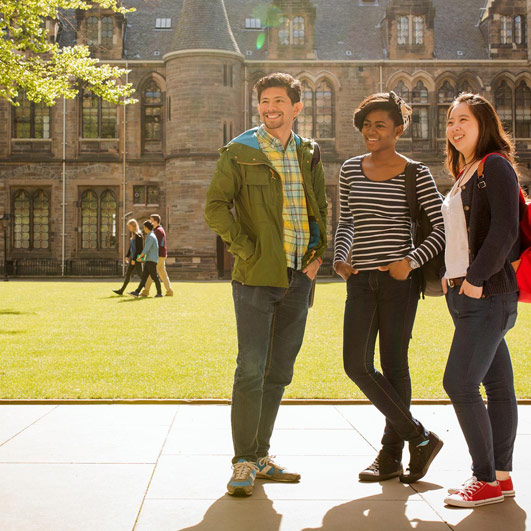University of Glasgow
The University of Glasgow is proud to be a world-leading international law school with a rich heritage. Law was one of the four original faculties established by the University of Glasgow, the fourth-oldest university in the English-speaking world, upon its founding in 1451. The subject has been taught continuously since 1714.
The University of Glasgow is a world top 100 university and a member of the prestigious Russell Group of leading UK research universities. Law at Glasgow is ranked 44th in the world in the Times Higher Education World University Rankings 2025 and 3rd in the UK by the Good University Guide 2025. At Glasgow, the diverse University community attracts students and staff from more than 140 different countries. The University leads six Erasmus Mundus Joint Master Degree Programmes as of 2025.
At the University of Glasgow, you will study International Law and Security. The programme focuses on the role and relevance of international law in a rapidly changing global security environment. It is delivered by members of the Glasgow Centre for International Law and Security (GCILS) based within the University of Glasgow’s School of Law. GCILS is a centre of excellence for research and training in the field of international law and security. It is home to a cosmopolitan community of around 40 active research staff and doctoral students, making it one of the most significant hubs for research and teaching in international law in the United Kingdom. University of Glasgow’s academics are leaders in their field with diverse research interests. The breadth of expertise and interest of our researchers is reflected in multiple specialist areas within the field of international law and security, broadly understood. The researchers approach international law from diverse angles (e.g. practice-oriented, critical, doctrinal) to produce work of global significance. Graduates of the University of Glasgow have gone on to work in international organisations, international courts, the European Commission, international law firms, governments, and academic institutions around the world.
ILSPSD students will benefit from access to GCILS staff, who will be teaching the ILSPSD courses, as well as GCILS’ resources, events, activities and work placement opportunities. You will have access to the wide-ranging expertise and resources reflecting the focus areas of ILSPSD, including through guest lectures by their staff members. Beyond the University of Glasgow, as Scotland’s largest city, Glasgow is a dynamic, modern city that hosts a significant academic community with its three universities, from which ILSPSD student will benefit.
The University and the School of Law are committed to inclusiveness, which embraces diversity by valuing and respecting the perspectives and contributions of all their colleagues and students. The School has a dedicated Decolonising the School of Law Forum aiming to ensure that the curriculum and teaching better acknowledge a diversity of cultures, philosophies and knowledge systems; concerned not only by what is taught and how it is critiqued, but also by how it is taught and experienced.
As Scotland’s largest city, Glasgow is a dynamic, modern city. Extracurricular activities may include trips to the Highlands and Islands or Edinburgh, where the Scottish Parliament and National Galleries are based. Within Glasgow, students will have the opportunity to visit Glasgow Museums, which is Europe’s largest civic arts collection. Glasgow’s artistic community has a long heritage of addressing war, conflict, human rights, environment, development and migration in its work. ILSPSD students will also have the opportunity to visit Scotland’s Secret Bunker, which is an underground Cold War era Nuclear Government Command Centre built in 1951; and to visit and speak with the residents of the Faslane Peace Camp, established in 1982 and the oldest permanent peace camp in the world devoted to nuclear disarmament. Glasgow is home to an active community of civil society organisations working on social justice and human rights. ILSPSD students will have to opportunity to meet and engage with the work of these organisations as part of several existing University of Glasgow and GCILS partnerships with civil society and the third sector.

